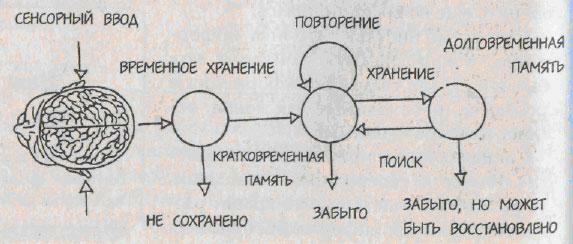Three - this is a very good figure
Below, we present a scientifically designed model of the flow of information, its perception and preservation.
You can be a passionate fan, or you can not even be interested in sports. Suppose you are still a fan. At the water cooler, you accidentally encounter a guy who tells you;"I just heard the score of today's game. Cowboys - 5, Laughing turtles - 4 ".
As soon as you hear from your friend the result of the game, information about him immediately gets to that part of the brain that is responsible for temporary storage of information or instant memory. Scientists claim that this site has a small capacity, probably sufficient for only one very short message. In accordance with this message "Cowboys" is stored here only a few short moments - from half a second to the longest, four seconds.
As soon as you hear "Laughing turtles - 4", the first block of information leaves the temporary storage and is replaced by the second one. If the instantaneous memory is all that you had, you would be absolutely helpless. You would live in an ever-changing instant, "eternal now", without a past and without a future. It would be reminiscent of what happened to the GM, but it would be even worse. At this point, your brain is facing a very important choice. Should the information be destroyed after the replacement? Or should it be transferred to the next level, in short-term memory? Every day you make this choice countless times, perceiving thousands or even millions of sensory impressions, colors, sounds, faces, smells, fleeting impressions and thoughts.
The overwhelming majority of them are quickly discarded. Yes, this is for the best;otherwise you would be buried under a mass of information, too large for it to be effectively processed. You would be disoriented and helpless in a sea of images and information.
From an early age you learned how to choose which information to save and which to discard. But sometimes this is clearly not enough. If you've ever sat in a classroom or a business meeting, absently observing what is happening, and suddenly you suddenly had the feeling that you just missed something important, it almost certainly means that some important information has just been visitedin your instant memory and was discarded.
The incoming information flows into several distinct phases. They could even be regarded as independent memory elements.

Source: M. Kurland, R.A.Lupof, "How to improve memory"
